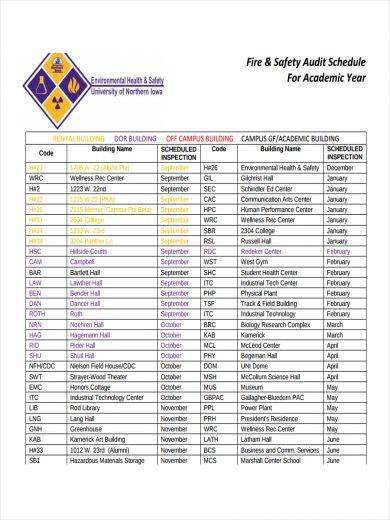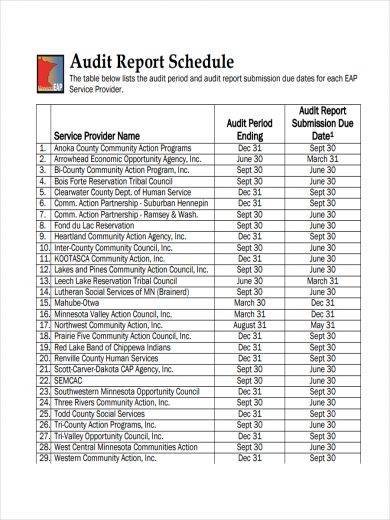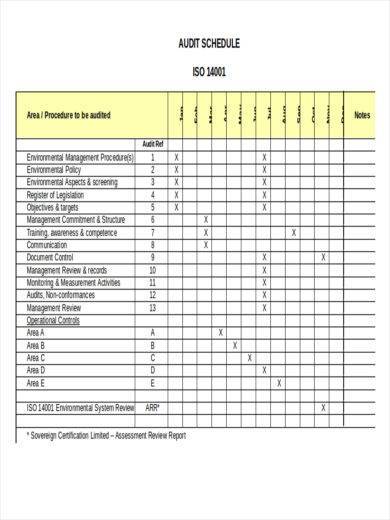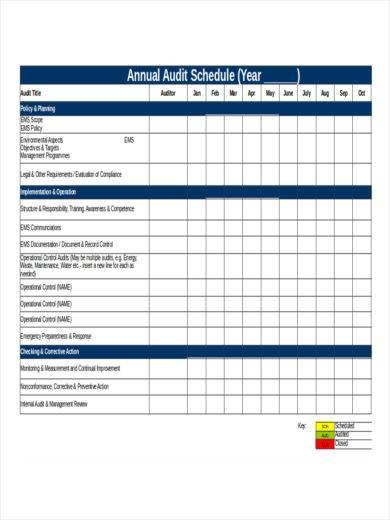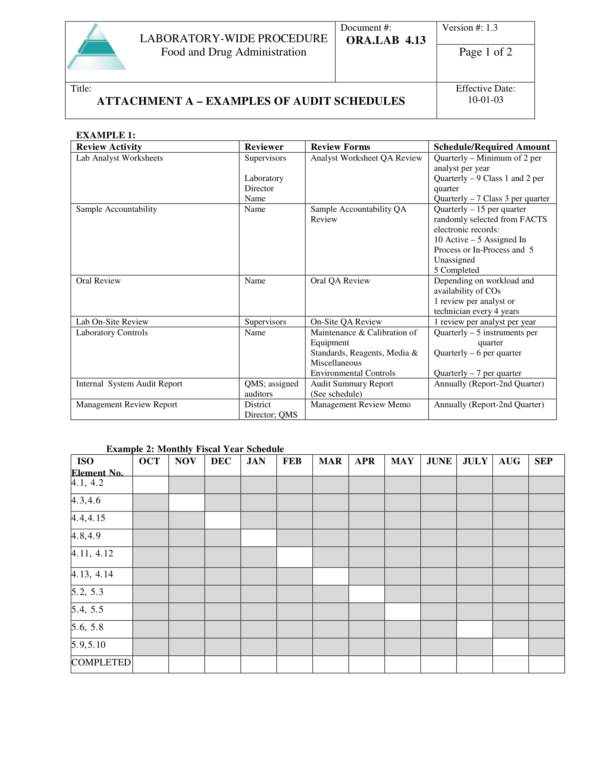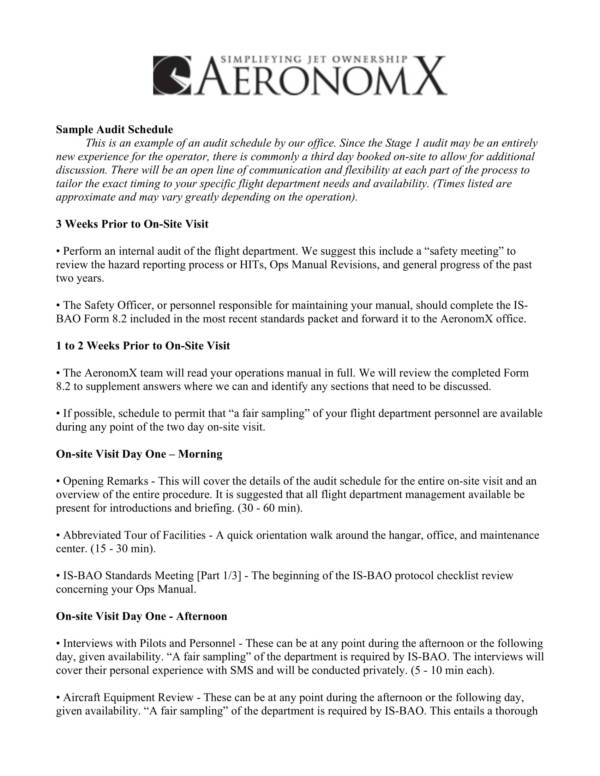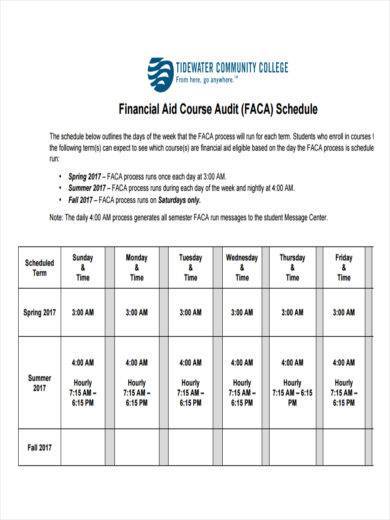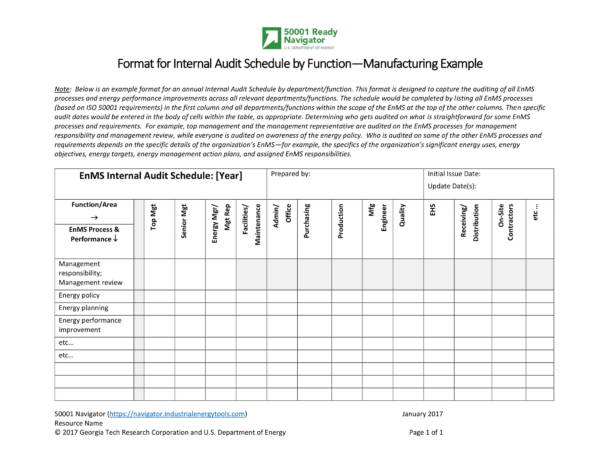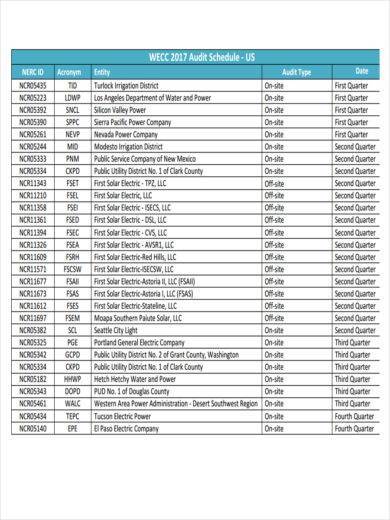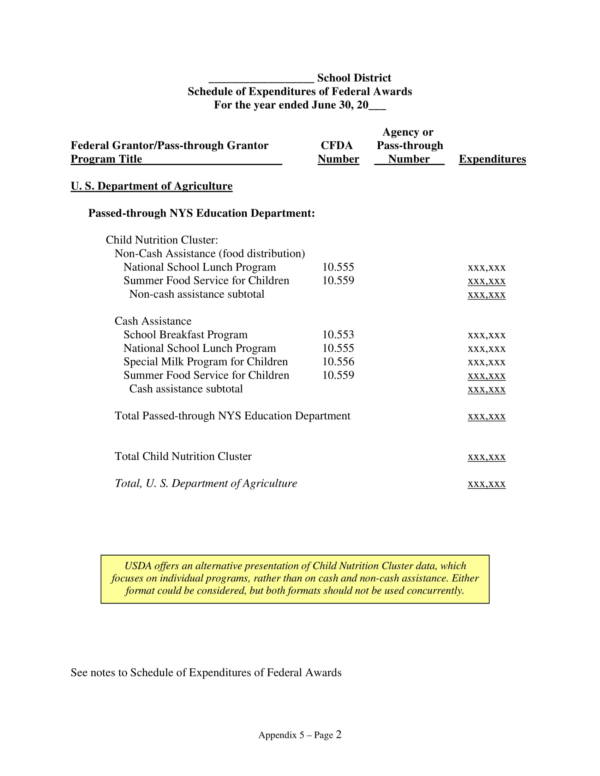In order for a business to grow, it needs to do a lot of things to improve itself until it becomes a figure known to a lot of entities. It needs to build a good reputation and good financial standing, which proves to be very important in the business industry. How can these improvements be done? Businesses have conducted evaluations that are known as audits. Audits help find and assess problems with the business so that a solution may be found. The steps involved in an audit are listed in detail using an audit schedule. You may also see the event schedule samples.
- Sample Schedules
- Sample Audit Plan Templates
Audit Schedule Template
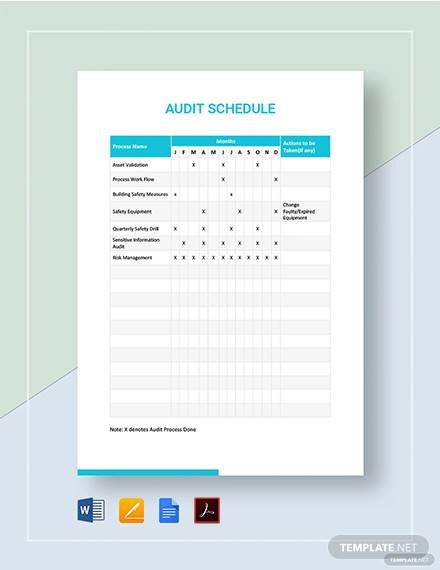
Attached to this article are downloadable audit schedule samples and templates in different varieties. They are mostly in PDF, but we also have them in Word and Excel format as well. If you check them out below, you may be able to find just what you are looking. To feed your curiosity about audit schedules, we also have included useful information that you need to know about them.
Safety Audit Schedule Sample
Audit Report Schedule Sample
Sample Schedule for Environmental Audit
Annual Audit Schedule Template
Audit Schedule Examples
Internal Audit Schedule Sample
What Is an Audit Schedule?
Audits are conducted to examine or evaluate the status or condition of an entity’s accounts or finances. The examination and evaluation are conducted either on individuals or in a company or organization. They are done by independent entities known as auditors. Audits can be done randomly or they may be announced. Before an audit is conducted, it is first scheduled with the use of an audit schedule. You may also like the printable daily schedule templates.
An audit schedule is a document or tool dedicated for use before, during, and after an audit is done. The schedule not only provides the dates when the audit will be conducted, but it also includes the specific time when the audit will be carried out, the sequence of activities involved in chronological order, and whole other things that need to be reviewed or examined. Audit checklists are often used together with audit schedules to provide the auditors a comprehensive list of tasks to complete the examination process.
What is the Difference between an Audit Plan and an Audit Schedule?
At first glance, you would probably come up with the conclusion that an audit plan and an audit schedule are two different things. Whoever came up with comparing them must not know what they are. This is how a lot of people see these two words, but for those people whose work are related and involves audits, this is something to be confused about. The tasks in an audit plan are often the same with the tasks included in an audit schedule, and this is where the confusion really comes from. In order to determine one from the other, we will need to determine their differences instead of their similarities.
Audit Schedule
- It provides a complete list of tasks and activities related to the audit.
- The date, time, and names of the people conducting the audit are listed in an audit schedule making sure that everything is covered every step of the way.
- The methods used in doing the audit are not only listed but are also defined so that proper evaluation is done.
- An audit schedule is written in a progressive pattern.
- It is a part of an audit plan even if it is used as a separate document.
Audit Plan
- It provides specific details of the activities that are planned for an audit.
- It contains a list of strategies on how an audit should be handled within a company or organization.
- An audit plan provides the scope of the audit or what is being covered in the audit, which includes the name and address of the company or individual being audited, the criteria for auditing, etc.
- May contain predefined audit questions that are going to be used while conducting an audit.
- An audit plan is often done with the use of an audit plan template.
Other related topics you might be interested in are, audit program samples and templates, sample audit memos, and audit quotations.
Why are Audits Important?
Audits are done mainly to evaluate or examine the current condition of a company’s finances and accounts. If audits are not conducted, any illegal and bad practices done within an organization cannot be detected, thus it cannot be stopped before worse comes to worst. Although it requires a lot of work to be done, there are many reasons why it is still being conducted.
1. Audit reports are provided after an audit is conducted. The results or findings found in the report will serve as a basis for companies and organizations as to who to trust and who to invest in. Good audit results will gain more client trust.
2. Conducting regular internal audits will help ensure the compliance of a company with any laws or regulations it is under.
3. It allows for the effective assessment of a company’s operations and controls that helps in improving the control setup of the company.
4. Identifying risks is something that is also covered in an audit. Through the examinations that are conducted, risk assessment and risk evaluations are performed. This prevents the possibility of any asset losses by protecting them before any predictable damage happens.
5. It helps in keeping track of any financial activities of a company and point out where things went wrong and what could have been done to make it better.
6. Part of an audit goes into reviewing the policies and procedures followed by the company and how compliant every employee is to these standards.
7. Audits that are done in an honest and unbiased manner to yield efficient and useful results that can truly help a company or organization do better and become better.
You may also check out audit program templates and internal memo templates.
Printable Audit Schedule Sample
Financial Audit Schedule Sample
Format for Internal Audit Schedule by Function
WECC Audit Schedule Sample
Sample Single Audit Schedule
What is an Internal Audit?
Internal audits are conducted within an organization to help in making improvements to the organization’s procedures as well as add value to the organization. Internal audits are performed by auditors hired by an organization instead of an independent entity. They are responsible for giving advice to organization leaders about things related to control, good governance, risk management and improvement of procedures and standards. An internal audit provides an insight of an organization’s condition that is based on thorough assessments and analyses of business processes.
Tips to Help You Prepare an Audit Schedule
Preparing for an audit is a very daunting task, and without proper planning and preparations, everything might just turn out to be chaotic. But, you can have that taken care of and make the preparations easy with the help of the following tips.
1. Make a Plan
Nothing beats how proper planning works. You need to provide enough time for planning so that things can be sorted out the way they should be and not in a rummaging and chaotic manner. If you are not in a rush, you surely will remember all there is to include in your plan. And if plan A won’t work, you are sure to have a plan B on standby. You planned it, you know what might happen, so you know what you should do.
2. Do Your Research
The main goal of doing research is to gather enough information that can be used for the upcoming audit schedule. It makes no difference whether you are preparing for an internal audit or an external audit. Doing research will provide you with a variety of actions to help you prepare an audit schedule.
3. Review Audit Plans from Previous Audits
Another good source of information is previous audit schedule records. Since they have been used and tested before, the efficiency of the document is often a guarantee.
4. Take Note of Failed Audit Schedules
We learn from our mistakes. With that being said, reviewing failed audit schedules will help you learn what to include and what not to include in your audit schedule preparation. If it has been proven to fail before, what makes you think it will succeed this time?
5. Make Revisions a Necessity
Don’t settle for one idea and definitely don’t settle for one revision. If you think that your work needs to be improved, then go ahead and have it updated. If an idea comes to mind and you think it will make your audit schedule even better, then go ahead and have it done. Just keep in mind that the revisions you make still make sense.
6. Consult a Professional
If you need to talk to someone to get advice for your audit schedule, it is best to do so with a professional. They can give you better advice more than anyone else you try to talk to. They can help you make the best decisions for your audit schedule.
7. Develop a Feasible Timeline
Make sure that the audit schedule you are preparing fits the timeline that is available for you. Otherwise, it would end up a waste to plan everything that cannot be done within a given time frame. Everything will just go to waste.
8. Stay up to Date with the Organization’s Accounting Standards
You will need to be updated with the company’s accounting standards as this will affect the audit done on your organization.
9. Organize Your Data
Data that is presented in an organized manner will be easily understood. It will also help you easily prepare for other related things and can also be a good source of audit schedule information for the years to come.
To get more tips about a variety of useful things, you may check out our website and explore the different tips and topics we are offering. To name a few are payroll tips from a tax professional, effective tips for making solid business contracts, and tips for writing a thank-you letter.
Related Posts
FREE 10+ Gym Schedule Samples in PDF | MS Word | Apple Pages | Google Docs | Keynote |
FREE 10+ Daily Hourly Schedule Samples in PDF
FREE 10+ Weekly Schedule Template with Hours Samples in PDF
FREE 10+ 7 Day Weekly Schedule Samples in PDF
FREE 10+ Working Schedule Template Samples in PDF
FREE 6+ Preschool Schedule Template Samples in PDF
FREE 10+ Daily School Schedule Samples in PDF | MS Word | Google Docs | Google Sheets | Excel
FREE 10+ Day Schedule Samples in PDF
FREE 10+ Daily Work Schedule Samples in PDF
FREE 10+ 24 Hours Schedule Samples in PDF | Word | Google Docs | Google Sheets | Excel | Apple Numbers | Apple Pages
FREE 10+ Baseball Schedule Samples in PDF
FREE 10+ Availability Schedule Samples in PDF
FREE 10+ Weekly Cleaning Schedule Samples in PDF
FREE 8+ Employee Scheduler Template Samples in PDF
FREE 10+ Weekly Work Schedule Samples in PDF

